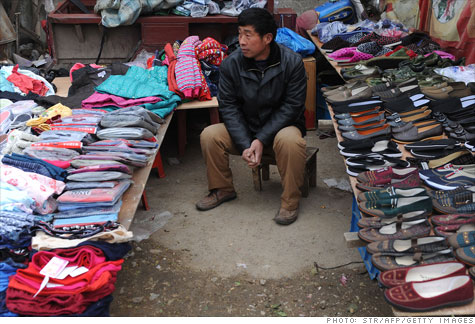- Joined
- Apr 5, 2009
- Messages
- 11,615
- Likes
- 5,772
China posts a surprise trade deficit as exports slow
China has reported a surprise trade deficit in February after exports slowed.
Shipments grew at a weaker-than-expected 2.4% in February from the same month a year ago, latest figures show.
Imports on the other hand increased by 19.4%, resulting in a trade deficit of $7.3bn (£4.5bn).
The news comes at a time when China has been facing criticism over its export-led growth policy.
Easing pressure
The US has led criticism of China, claiming it keeps the value of its currency, the yuan, artificially low so that it can boost foreign sales.
A weaker currency makes Chinese goods more affordable, giving the country's exporters an advantage over many competitors.
In recent years there have been repeated calls for China to let its currency appreciate against the US dollar.
Analysts say February's surprise deficit numbers may ease that pressure.
"A trade deficit offers relief to the international trade imbalance, and it may help to reduce pressure on the yuan to appreciate," said Wang Jianhui of Southwest Securities.
Mr Wang also said that as China works towards rebalancing its trade and increasing domestic demand, the slowdown in exports could continue in coming months.
"The Chinese government will be happy to see a modest trade deficit for a while," Mr Wang said.
Misfiring?
China's growth over the past years has been powered by its surging exports.
But as demand in its key markets such as the US and Europe has slowed, China has said it will focus on increasing domestic consumption in order to maintain economic growth.
However, analysts say that the latest numbers may point to deeper problems, not least the fact that domestic demand is not picking up as much as first hoped.
Imports are considered a good measure of domestic demand. In February, while they were expected to grow by more than 30%, they rose by 19.4%.
"It is definitely not a good sign," said Xu Biao of China Merchants Bank.
Mr Xu said that the latest figures may show that demand in mainland China is faltering.
"Imports have dropped significantly, and it points to a serious weakening in domestic economic activity," he said.
China has reported a surprise trade deficit in February after exports slowed.
Shipments grew at a weaker-than-expected 2.4% in February from the same month a year ago, latest figures show.
Imports on the other hand increased by 19.4%, resulting in a trade deficit of $7.3bn (£4.5bn).
The news comes at a time when China has been facing criticism over its export-led growth policy.
Easing pressure
The US has led criticism of China, claiming it keeps the value of its currency, the yuan, artificially low so that it can boost foreign sales.
A weaker currency makes Chinese goods more affordable, giving the country's exporters an advantage over many competitors.
In recent years there have been repeated calls for China to let its currency appreciate against the US dollar.
Analysts say February's surprise deficit numbers may ease that pressure.
"A trade deficit offers relief to the international trade imbalance, and it may help to reduce pressure on the yuan to appreciate," said Wang Jianhui of Southwest Securities.
Mr Wang also said that as China works towards rebalancing its trade and increasing domestic demand, the slowdown in exports could continue in coming months.
"The Chinese government will be happy to see a modest trade deficit for a while," Mr Wang said.
Misfiring?
China's growth over the past years has been powered by its surging exports.
But as demand in its key markets such as the US and Europe has slowed, China has said it will focus on increasing domestic consumption in order to maintain economic growth.
However, analysts say that the latest numbers may point to deeper problems, not least the fact that domestic demand is not picking up as much as first hoped.
Imports are considered a good measure of domestic demand. In February, while they were expected to grow by more than 30%, they rose by 19.4%.
"It is definitely not a good sign," said Xu Biao of China Merchants Bank.
Mr Xu said that the latest figures may show that demand in mainland China is faltering.
"Imports have dropped significantly, and it points to a serious weakening in domestic economic activity," he said.


